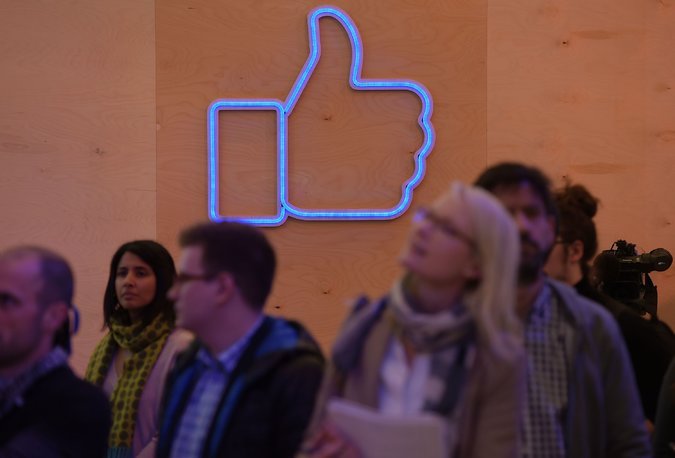For all the courtship, things never quite worked out.
“There’s an interest on both sides of the dance, so some kind of product can be introduced,” said Kai-Fu Lee, the former head of Google in China who now runs a venture-capital firm in Beijing. “But what Facebook wants is impossible, and what they can have may not be very meaningful.”
This spring, Facebook tried a different tactic: testing the waters in China without telling anyone. The company authorized the release of a photo-sharing app there that does not bear its name, and experimented by linking it to a Chinese social network called WeChat.
One factor driving Mr. Zuckerberg may be the brisk ad business that Facebook does from its Hong Kong offices, where the company helps Chinese companies — and the government’s own propaganda organs — spread their messages. In fact, the scale of the Chinese government’s use of Facebook to communicate abroad offers a notable sign of Beijing’s understanding of Facebook’s power to mold public opinion.
Chinese state media outlets have used ad buys to spread propaganda around key diplomatic events. Its stodgy state-run television station and the party mouthpiece newspaper each have far more Facebook “likes” than popular Western news brands like CNN and Fox News, a likely indication of big ad buys.
To attract more ad spending, Facebook set up one page to show China’s state broadcaster, CCTV, how to promote on the platform, according to a person familiar with the matter. Dedicated to Mr. Xi’s international trips, the page is still regularly updated by CCTV, and has 2.7 million likes. During the 2015 trip when Mr. Xi met Mr. Zuckerberg, CCTV used the channel to spread positive stories. One post was titled “Xi’s UN address wins warm applause.”

Fittingly, Mr. Zuckerberg’s eagerness and China’s reluctance can be tracked on Facebook.
During Mr. Xi’s 2015 trip to America, Mr. Zuckerberg posted about how the visit offered him his first chance to speak a foreign language with a world leader. The post got more than a half million likes, including from Chinese state media (despite the national ban). But on Mr. Xi’s propaganda page, Mr. Zuckerberg got only one mention — in a list of the many tech executives who met the Chinese president.
Advertisement
Continue reading the main story
Europe’s Privacy Pushback
Last summer, emails winged back and forth between members of Facebook’s global policy team. They were finalizing plans, more than two years in the making, for WhatsApp, the messaging app Facebook had bought in 2014, to start sharing data on its one billion users with its new parent company. The company planned to use the data to tailor ads on Facebook’s other services and to stop spam on WhatsApp.
A big issue: how to win over wary regulators around the world.
Despite all that planning, Facebook was hit by a major backlash. A month after the new data-sharing deal started in August 2016, German privacy officials ordered WhatsApp to stop passing data on its 36 million local users to Facebook, claiming people did not have enough say over how it would be used. The British privacy watchdog soon followed.
Newsletter Sign Up
Continue reading the main story
Thank you for subscribing.
An error has occurred. Please try again later.
You are already subscribed to this email.
By late October, all 28 of Europe’s national data-protection authorities jointly called on Facebook to stop the practice. Facebook quietly mothballed its plans in Europe. It has continued to collect people’s information elsewhere, including the United States.
“There’s a growing awareness that people’s data is controlled by large American actors,” said Isabelle Falque-Pierrotin, France’s privacy regulator. “These actors now know that times have changed.”
Facebook’s retreat shows how Europe is effectively employing regulations — including tough privacy rules — to control how parts of the internet are run.

The goal of European regulators, officials said, is to give users greater control over the data from social media posts, online searches and purchases that Facebook and other tech giants rely on to monitor our online habits.
As a tech company whose ad business requires harvesting digital information, Facebook has often underestimated the deep emotions that European officials and citizens have tied into the collection of such details. That dates back to the time of the Cold War, when many Europeans were routinely monitored by secret police.
Now, regulators from Colombia to Japan are often mimicking Europe’s stance on digital privacy. “It’s only natural European regulators would be at the forefront,” said Brad Smith, Microsoft’s president and chief legal officer. “It reflects the importance they’ve attached to the privacy agenda.”
Advertisement
Continue reading the main story
In interviews, Facebook denied it has played fast and loose with users’ online information and said it complies with national rules wherever it operates. It questioned whether Europe’s position has been effective in protecting individuals’ privacy at a time when the region continues to fall behind the United States and China in all things digital.
Still, the company said it respected Europe’s stance on data protection, particularly in Germany, where many citizens have long memories of government surveillance.
“There’s no doubt the German government is a strong voice inside the European community,” said Richard Allan, Facebook’s head of public policy in Europe. “We find their directness pretty helpful.”
Europe has the law on its side when dictating global privacy. Facebook’s non-North American users, roughly 1.8 billion people, are primarily overseen by Ireland’s privacy regulator because the company’s international headquarters is in Dublin, mostly for tax reasons. In 2012, Facebook was forced to alter its global privacy settings — including those in the United States — after Ireland’s data protection watchdog found problems while auditing the company’s operations there.
Three years later, Europe’s highest court also threw out a 15-year-old data-sharing agreement between the region and the United States following a complaint that Facebook had not sufficiently protected Europeans’ data when it was transferred across the Atlantic. The company denies any wrongdoing.

And on Sept. 12, Spain’s privacy agency fined the company 1.2 million euros for not giving people sufficient control over their data when Facebook collected it from third-party websites. Watchdogs in Germany, the Netherlands and elsewhere are conducting similar investigations. Facebook is appealing the Spanish ruling.
“Facebook simply can’t stick to a one-size-fits-all product around the world,” said Max Schrems, an Austrian lawyer who has been a Facebook critic after filing the case that eventually overturned the 15-year-old data deal.
Potentially more worrying for Facebook is how Europe’s view of privacy is being exported. Countries from Brazil to Malaysia, which are crucial to Facebook’s growth, have incorporated many of Europe’s tough privacy rules into their legislation.
Advertisement
Continue reading the main story
“We regard the European directives as best practice,” said Pansy Tlakula, chairwoman of South Africa’s Information Regulator, the country’s data protection agency. South Africa has gone so far as to copy whole sections, almost word-for-word, from Europe’s rule book.
The Play for Kenya
Blocked in China and troubled by regulators in Europe, Facebook is trying to become “the internet” in Africa. Helping get people online, subsidizing access, and trying to launch satellites to beam the internet down to the markets it covets, Facebook has become a dominant force on a continent rapidly getting online.
But that has given it a power that has made some in Africa uncomfortable.
Some countries have blocked access, and outsiders have complained Facebook could squelch rival online business initiatives. Its competition with other internet companies from the United States and China has drawn comparisons to a bygone era of colonialism.
For Kenyans like Phyl Cherop, 33, an entrepreneur in Nairobi, online life is already dominated by the social network. She abandoned her bricks-and-mortar store in a middle-class part of the city in 2015 to sell on Facebook and WhatsApp.

“I gave it up because people just didn’t come anymore,” said Ms. Cherop, who sells items like designer dresses and school textbooks. She added that a stand-alone website would not have the same reach. “I prefer using Facebook because that’s where my customers are. The first thing people want to do when they buy a smartphone is to open a Facebook account.”
As Facebook hunts for more users, the company’s aspirations have shifted to emerging economies where people like Ms. Cherop live. Less than 50 percent of Africa’s population has internet connectivity, and regulation is often rudimentary.
Since Facebook entered Africa about a decade ago, it has become the region’s dominant tech platform. Some 170 million people — more than two thirds of all internet users from South Africa to Senegal — use it, according Facebook’s statistics. That is up 40 percent since 2015.
The company has struck partnerships with local carriers to offer basic internet services — centered on those offered by Facebook — for free. It has built a pared-down version of its social network to run on the cheaper, less powerful phones that are prevalent there.
Continue reading the main story
Article source: https://www.nytimes.com/2017/09/17/technology/facebook-government-regulations.html?partner=rss&emc=rss
Speak Your Mind
You must be logged in to post a comment.